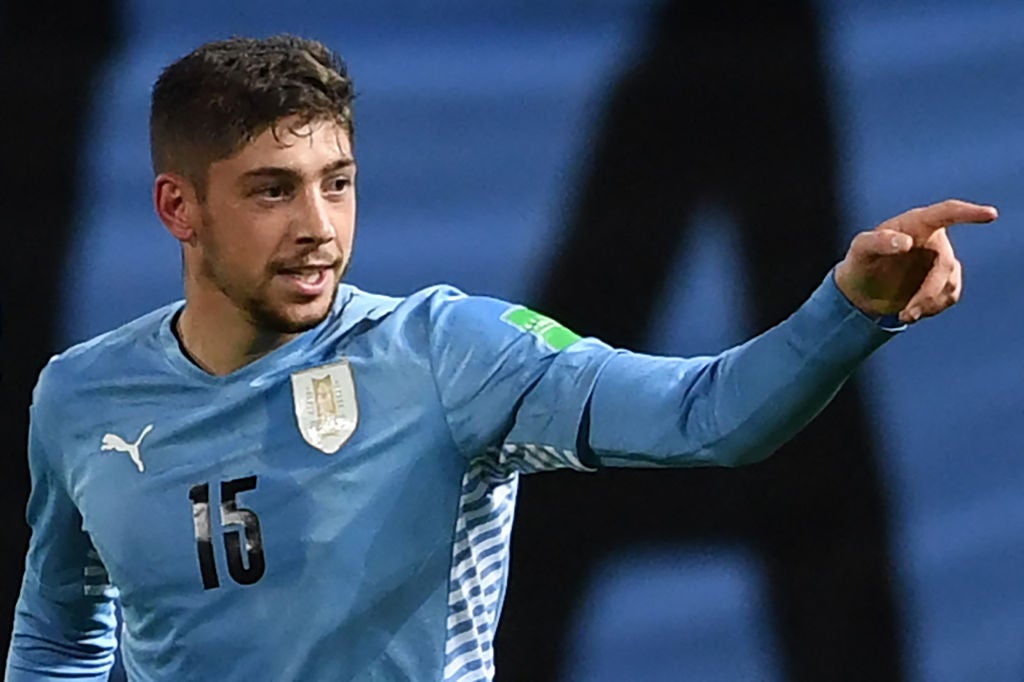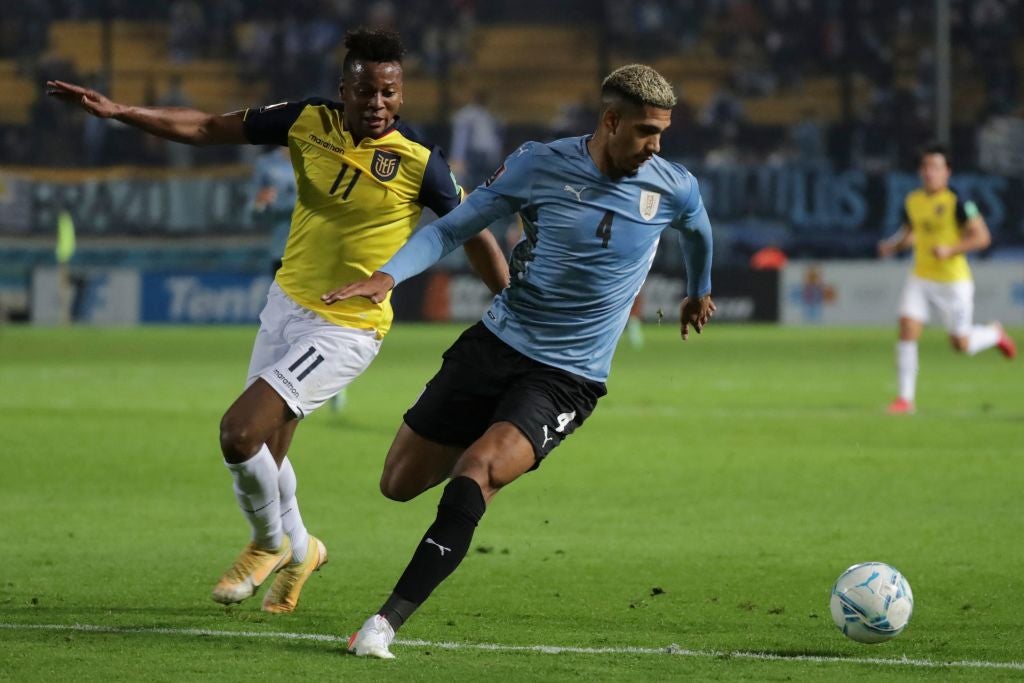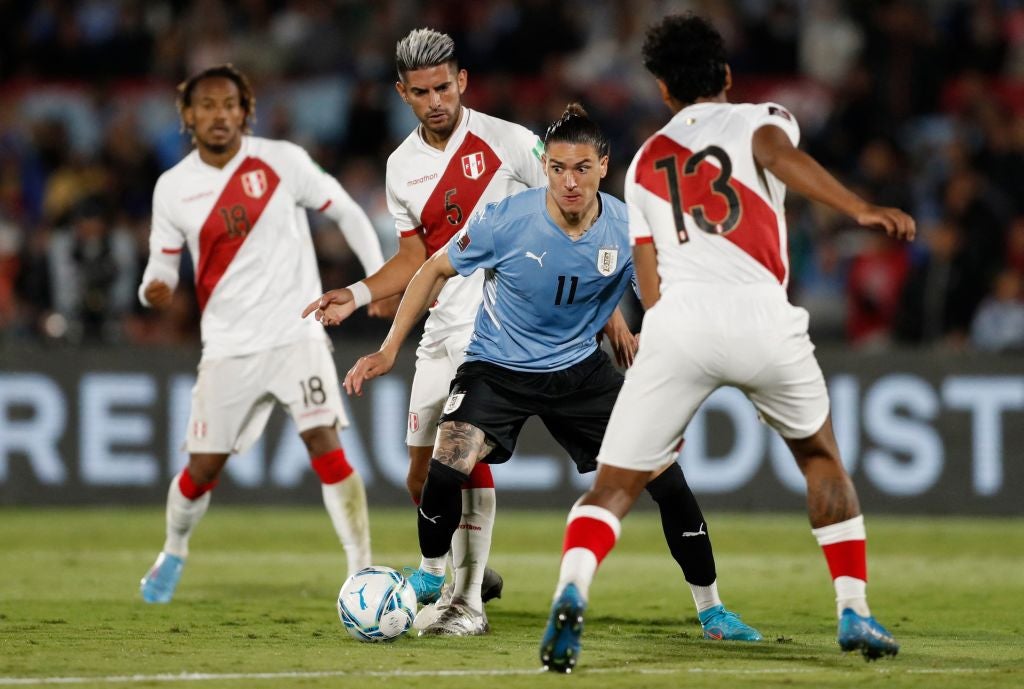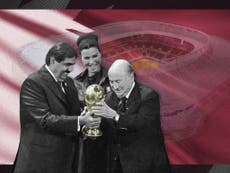Uruguay perfect World Cup dark horses with Federico Valverde at the heart of their regeneration
In Federico Valverde, La Celeste have one of the most in-form midfielders on the planet and they will be hoping to go far beyond their initial Group H games

Your support helps us to tell the story
From reproductive rights to climate change to Big Tech, The Independent is on the ground when the story is developing. Whether it's investigating the financials of Elon Musk's pro-Trump PAC or producing our latest documentary, 'The A Word', which shines a light on the American women fighting for reproductive rights, we know how important it is to parse out the facts from the messaging.
At such a critical moment in US history, we need reporters on the ground. Your donation allows us to keep sending journalists to speak to both sides of the story.
The Independent is trusted by Americans across the entire political spectrum. And unlike many other quality news outlets, we choose not to lock Americans out of our reporting and analysis with paywalls. We believe quality journalism should be available to everyone, paid for by those who can afford it.
Your support makes all the difference.The original World Cup winners, and indeed hosts, Uruguay have been part of international folklore for as long as that version of the game has been around.
Unlike some others from that part of the world, though, the story of La Celeste has not always been one of romance and achievement, of being giants and being admired, their names woven into World Cup fabric as often as they would have liked.
The tenth-biggest nation in South America by population went from mythical to missing on the global stage in the space of less than three decades.
Between 1978 and 1998 they qualified only twice and tasted victory only once. It has been a long road back for the Sky Blue side, but a golden generation of players was overseen and developed by the legendary Oscar Tabarez and now, under the guidance of Diego Alonso, they are showing that a generational team doesn’t have to be restricted to a single generation.
Uruguay are very much a force to reckoned with in Qatar at World Cup 2022, a team with players who know their roles, proven goalscorers and committed faces aplenty and, crucially, a handful of elite talents playing near the top of their game.
It’s worth first, though, rewinding 20 years, back to 2002 and the South Korea and Japan finals. That Uruguay squad had household names in it: Paolo Montero, Dario Silva, Alvaro Recoba and a relatively young Diego Forlan. There was star power, technique aplenty with much of the squad based in Serie A or La Liga, yet little cohesion and ultimately no success, despite a close call beforehand at the Copa America.
Yet again, they failed to win and exited at the group stage. At that point the two-time World Cup winners had won a single game since 1970; it would remain the case all the way through until South Africa 2010 after another failed attempt to reach Germany.
Enter Tabarez.
It was he who put together the squad which seemed built out of granite and just about as long-lasting: Fernando Muslera, Diego Godin, Edinson Cavani, Luis Suarez, Martin Caceres. They were all there in 2010; they’re all still here in Qatar a dozen years later.
Add in the likes of defenders Diego Lugano and Jorge Fucile, full-backs Alvaro and Maxi Pereira, combative midfielder Walter Gargano and the aforementioned Forlan and the guts of a team was there which would span multiple tournaments, reaching the knock-outs three times in a row - including the semis in South Africa - and, on top of all that, finally triumphed again in the Copa America 2011.

Uruguay’s squad barely seemed to change a whole lot across those three World Cups under Tabarez, not much in style and not at all in key personnel. Yet age catches everybody, of course, including Tabarez himself - “el Maestro” eventually departed during qualification for these finals, having won four of 14 games.
In came Alonso and four wins from four later, Uruguay were at a fourth straight finals for the first time since ‘74.
And so it’s a new manager, though not entirely a new team. But enough of one to show how regeneration can be managed and integrated; gradually to begin with, then allowing the full force of the younger, most in-form and effective players to take centre stage.
This is a squad with five centurions still among them; the renewal of the side is ongoing and not yet complete. Some parts will be tough to replicate, not least of all the consistency and longevity of No1 Muslera, now age 36. His fellow ‘keepers in the squad are aged 29 and 36 as well; between them they have nine caps. Muslera has 133.
But in front of him, the Atletico Madrid-inspired axis of Godin and Josema Gimenez has long been rusting and increasingly held together by staples, sticky tape and a fierce sense of national pride; now it has had the genuine class of Ronald Araujo added to it. This World Cup might be too soon after surgery for him to shine in, but he offers the promise of a decade of service.
Further upfield, midfield is no longer just the battleground upon which Uruguayan soldiers will lay down their life and yours just to win a 50-50 tackle, but a playground where one-touch passing, incredible athleticism and genuine creativity can thrive.
Rodrigo Bentancur is an excellent performer. Manuel Ugarte offers a blend of old school relentlessness and new-age technique.
And, head and shoulders above them all, is Champions League-winning midfielder Federico Valverde.
Some have gone as far to say he could win the Golden Ball in Qatar; it’s far from outrageous. He was Europe’s most in-form midfielder before the domestic scene paused.

Nobody covers as much ground as he does; few have the tactical discipline, technical excellence and team-first ethic to do it all game long, every game. Considering we’ve been having matches with 100 minutes and more in Qatar, a Valverde injury time goal or two is a pretty good bet simply because others will be blowing while he looks like he could play another match.
And even in attack, where the iconic and record-setting Forlan, then Cavani, then Suarez have now each marched to the very ends of their powers, regeneration is on show.
Darwin Nunez is an at-times raw but ridiculously talented powerhouse. The pair of Facundos, Torres and Pellistri, could yet hit heights untold too - they are 22 and 20 and neither have a senior goal for Uruguay, but are well thought of.
Araujo, Bentancur, Valverde and Darwin are the spine of Uruguay’s future, all aged 23 to 25 and primed to dominate, match-to-match and year to year.
With most of those in top shape and form and the handful of old-timers still more than playing their part, there could yet be a historical run ahead this month for the most original of World Cup originals.




Join our commenting forum
Join thought-provoking conversations, follow other Independent readers and see their replies
Comments